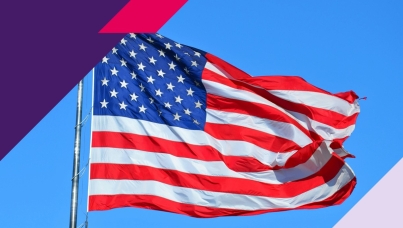The generational gap on climate change isn’t what you think
The Ipsos Consumer Tracker asks Americans questions about culture, the economy and the forces that shape our lives. Here's one thing we learned this week.
In the public imagination, Gen Z is often seen as a uniquely eco-conscious cohort. Yet younger Americans’ attitudes on the causes of climate change generally fall in line with those of the general population, according to the Ipsos Consumer Tracker.
The real generational gap? Younger Americans are much more pessimistic on the prospects of reducing the effects of climate change, particularly as individuals.
Contrary to received wisdom, younger Americans’ attitudes on the climate are not uniform. 21% of those aged 18-34 think climate change is mostly caused by natural patterns, and 6% say it isn’t really happening.
But this proportion generally mirrors that of older Americans: 61% of those aged 18-34 say climate change is mostly caused by human activity, compared with 63% of those 35-54 (and 51% of those 55+).
With this in mind, it’s striking where generational attitudes have diverged — that is, on what is to be done about climate change.
More than half (54%) of Americans aged 18 to 34 agree that “large corporations and government policy can reduce climate change, but individual action makes no difference.” (15% of them strongly agree).
41% of those aged 35-54, and just 19% of those over 55, feel the same. And that break goes beyond a disagreement on tactics: 39% of those aged 18-34 agree that it is “too late to stop climate change at this point,” compared with 24% of those 55+.
This isn’t necessarily a coherent worldview. The 18-34 cohort was most likely to say that “it will get more difficult to stay in the area they currently live due to climate change,” yet also more likely to say that “climate change will have mostly positive effects.”
But it also isn’t the first sign we’ve seen of climate fatalism among Gen Z.
Ipsos’ Earth Day 2024 report, a global survey of attitudes on the climate, noted that “Millennial men, followed very closely by Gen Z men, are the most likely cohort to agree that climate change is beyond our control and it’s too late to do anything about it (32% and 30% respectively)."
Younger people, and young men in particular, globally were also less likely to agree that their individual actions could make a difference on the climate.
“People are broadly in agreement that climate change is happening, but they are becoming increasingly fatalistic about the difference they as an individual can make. And we do see young people, especially young men, feeling powerless in taking action against the climate crisis,” said Jamie Stinson, content director for the Ipsos Knowledge Center.
To be clear, this isn’t a huge gap. But it is quite the shortfall if you’re counting on Gen Z to save the planet.
Last year’s Ipsos Global Trends report, built from a survey of more than 50,000 citizens across 50 global markets, noted that attitudes around climate change have started to converge on the global stage. Generally speaking: People around the world know about climate change and believe it exists.
But that report also flashed a warning sign around what we dubbed “Nouveau Nihilism” — a widespread feeling that in an uncertain world, it’s better to live for today. That feeling is particularly acute among young people, who tend to be more pessimistic on the attainability of traditional cultural milestones like a home or a family (and not without reason).
Altogether, it seems that institutions and brands alike may have a harder time than they might expect convincing younger people that their individual actions on the climate can matter. And that’s particularly true at a time where other preconceived notions about Gen Z and its politics are being refuted or reconsidered.
But this also signals the heightened expectations younger Americans have for the actors that they say can make a difference: brands, institutions and governments.
“While there are generational differences on the effectiveness of individual actions, there is agreement across the age groups that brands have a big role to play on climate change. One thing that is clear is people are not sure on how their actions can have the most impact, so there are opportunities for companies to play a greater leadership role in this space,” Stinson said. “Brands need to make sure they are giving people sustainable choices that are easy and enjoyable. People want to play their part in the fight against climate change, but they do not want to make sacrifices to do it.”
More insights from this wave of the Ipsos Consumer Tracker:
We know climate change is a thing. But some of us think it's a good thing?
The housing market is crunched, and Americans are feeling it
Americans still have a complicated relationship with AI
America’s love for Valentine’s Day is unbending
Most Americans plan to watch the Super Bowl, but many are more excited for the puppy bowl
The Ipsos Care-o-Meter: What does America know about vs. what does America care about



